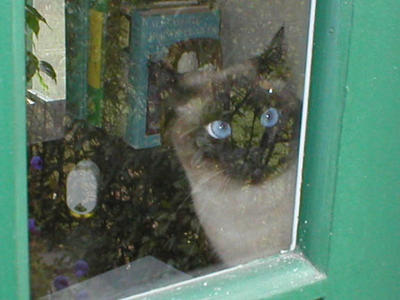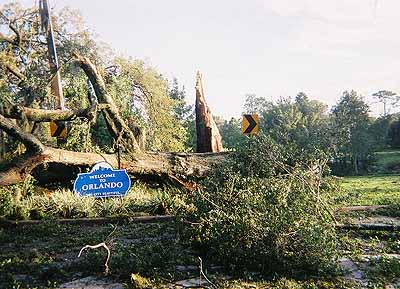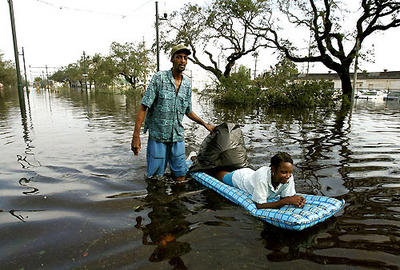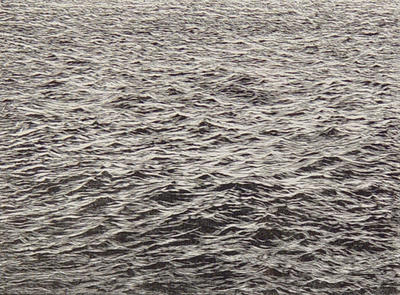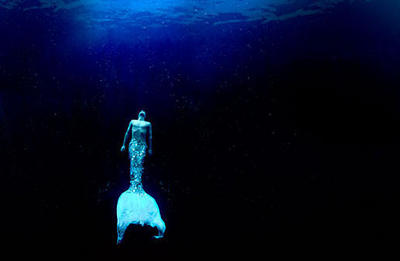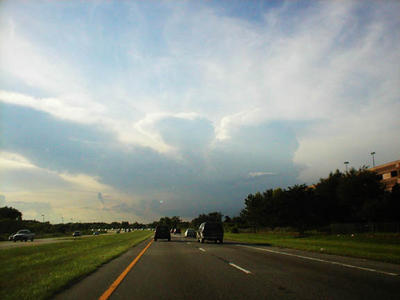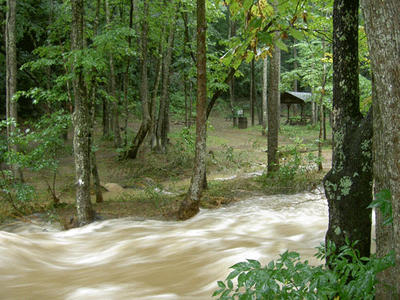Rubedo Libido

Panic over gas ebbed considerably yesterday, no lines at the gas station though the fuel's over three bucks a gallon. The scenes in New Orleans, especially at the Super Dome, reminding me of Robert Coover's novel Gerald's Party, where the proceedings of the night reduce the original scene to muck and mire, each scene adding more filth, detritus, and error, making things so ugly as to be almost unreadable, though the fiction churns merrily along. Dead bodies -- one in a wheelchair -- amid the thousands outside the 'Dome in the heat, waiting for bus transport elsewhere, conditions in the dome -- powered down, stunk high, slimed deep, -- of an awfulness none may every find words to fully describe. How quickly things can pitch treacherously down into disorder ... My wife watching the news relentlessly, overwhelmed by the horror, apocalyptically angry at the Bush administration, at all powers, for failing to do anything about the situation. I want to watch the UCF-South Carolina football game, I've had enough of that reality, there's only so much you can watch before the loop has to be filed away ... Going to bed last night, turning out the light, a termite on the alarm clock as I set it, one of the winged swarm, guess the humid weather is driving them out again ... no money to pay removing 'em right now, not enough money to get through next month, the worst of times to be entering the worst of times ... Waking at 2:45 a.m. with a massive migraine, spear thrust through the base of my skull, nothing to do but take a Frova, nurse an ice pack, against the wounded sump of my head, flip channels on the tube's Tartarean waste of infommercials, looters on CNN, hip hop booty music vids, 60s sitcoms, endless loops of sporting brilliance, jagged pay-TV softcore porn, the static and shatter of interference insufficient to hide heaving breasts, bouncing curves, the facial calculus of ecstasy ...
And then, around 3:30, shut off the tube, ditch the ice pack, and get to work.
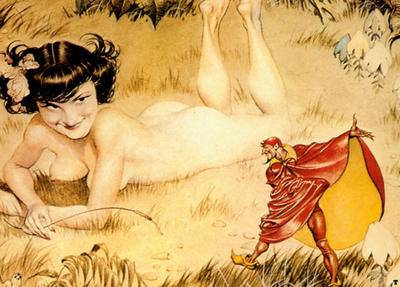
Carl Kerenyi on the nature of myth from his Prolegomena to Essays on a Science of Mythology Bollingen 22, transl. RFC Hull:
"A particular kind of material determines the art of mythology, an immemorial and traditional body of tales about gods and god-like beings, heroic battles and journeys to the Underworld -- "mythologem" is the best Greek word for them -- tales already well known but not unamenable to further reshaping. Mythology is the movement of this material; it is something solid yet mobile, substantial yet not static, capable of true transformation."
***
Myth is mobile on the wings of eros, on the fins of desire, leaping up and out and over to the other side where the beloved awaits, where the dragon waits for battle, where the grail is clutching in a sleeping king's hand ... so the tale has booty, a sauciness to it, causing glands to swell and hearts to beat wildly and an overwhelming wave flood through, insanely pent on release. Our hero is a victim of passion, his crimes of the heart and points south, unpremeditated, hardly conscious at all -- his crimes are excusable for that reason, not like the malevolent guile of the plotter and intriguer, a repeated sin but not in kind to the serial killer or rapist, overwhelmed by the waters rather than cunning an employ of them.
***
Two dreams:
I'm back at the JC Penney warehouse [where I worked 28 years ago and is a recurrent dream-setting], where everything has been removed: now its just a huge warren of industrial-looking, vaulting rooms & docks. Some greasy substance has been laid on the floor. Alone in this necropal hive of former activity, I hold some kind of wheel-less stock cart or dolly; I jump out as if body-surfing, "riding" the board over greased floors room after room through the labyrinth. A joy. Then I convince Brian [who worked the loading dock at Penny's all those years ago, and who may still be working there, for all I know -- a consistent, dedicated, simple guy] to try riding with me. The rooms now include the departments above, also emptied, their former stock (lamps, appliances, women's lingerie) piled in the periphery. (As if cleared for this purpose). Brian talks about approaching our task differently, more modestly, our boards turned right side up. He tells me how no woman has accepted or wanted him, because of his dutiful blue-collar station; I respond that he's a great guy, a real find for any woman in this world. Then we set off, gliding on those boards or wheels or runners, joyfully gliding through the grand empty rooms of some lost or forgotten or bankrupted enterprise.
-- March of this year
***
I go back to the "scene of an old crime" -- back to the bedroom of a young woman I once had wanted to fuck in a one-night stand of the dreariest, lowest-bottomed state. The girl is unlovely but fuckable, unchanged in that room after some 20 years. She wonders why I have come, why I will stay, being from the land of the living and faithfully married, and she a dead memory. Why of course for the sex, I say, and the dream slowly strays to that, the room in a warehouse I worked in long ago, with a bright day hammering the outsides of the building, the hour the long end of a hard drinking night. She is exactly who she is, yet has lucency I never considered or could see before, a waif-naif whore-ridin bride who glows with the sexuality I desire, offering it to me like a priestess, admiring my white underwear, poking into the crotch to fish for my cock, humming, smiling, mergin here with my wife sleeping next to me, their bodies and voices seaming into to blue hands in the dark descending, arousing, pleasing, pleading.
-- from May of this year
***
Such the hell of sweet desire: locus of making, labyrinth of greased passage, bed of blue fire, flame of insatiability, flood-tide of release. The hero's descent into hell makes a cuckold of Hades, Persephone Herself enflamed with this daring spelunker, she another of the long procession of women conquered by their passion for him, in the grand calculus of natural selection, making of his brute bluster the sweetest violins ever to part the dread thighs of the Queen of Hell ---
Desire the frontispiece of that masterpiece called love, fomenting wild and huge in the imagination, all about the hurricane's approach, the awe, swelling organ music, swollen equipage, the heart like a tin-drum in the metallic exictement of the chase, all thought driven down to the loins, heedless of sense, of order, of God: Ares thrusting straight and single-mindedly toward the bed of Aphrodite, all that war-like spleen now servicing the liver, the balls, smith-god Hephaistos (husband of Aprhodite) be damned, Olympus be damned -- how those high gods all were so reckless in their lustful pursuits, engendering all sorts of transformations in that reach which collapses all desire -- Daphne into laurel, Demeter into the mare-mother of Arion, the fiery spout of Zeus engendering Apollo, Hermes, Eros, Dionysos, Herakles, -- archangels all of of hot spirit inflamed buy blue depths- --
But that hot face is eager not for union but transformation, the motion of the leaping trope, translating one essence into another; and the goal, as I have said earlier, is only surficially that of sex, which is the literal conjunction of a literate thrall for combining, leaping over, metamorphosing style, method, mode, genre, poetics: the goal hotly plunging into cleavage and cunny is not engined by the balls but the heart, or the male-female singer there, moving our stories along the labyrinth, weaving together in its skein inside and outside, known and gnomon, archangel and baboon, pen and penis, starry passion and low rut, moony brilliance and dark water, cat and window, nymph and wife, migraine and meditation, moving the story along in the name of the myth, its iterations and engenderings and transformations.
***
Guilty desire is the swampiest of all, it hauls the hero by the ankles down into regions he would never otherwise trespass. Sex the sweetest breasts of anima proferred to my tool-makin', forward-striving consciousness, slowing me down, whispering c'mere, relax, set down a spell, have a sip of this, drawing me into the dark drowsy peripheries where something other enkindles and then rages, not the forward motion but the downward plunge, into the Her mere, her vast blue dissembling keep.

DESIRE
Aching stars:
this hopeless longing
for the forever-withheld,
miasmically-waylaid clench
of all you offered in one glance.
Arrival and departure
the same portal.
Desire a wild
gallop through fields
of strawberry wheat
in early autumn,
riding harder toward
your absence.
There it pulses,
beacon to strange
and reckless waters,
open wide and forever
deaf to consequence,
shining faintly on
the next door, the next room,
the next blue bed where you
in all your faces wait,
out beyond the breakers
of any moon-struck beach,
dangerous and darker
and wilder than
this heart has ever
dreamt. But will.
KIMBERLEY BLUE
She is a blue stream
winding through
the smoke and booze
long brown hair
and blue blue eyes
the high tide of her body
straining against
the shore of her dress
blue spandex sparkling
like morning water
in this jaded light
She stops before me
with all night behind
all winter outside
all broken hearted
somehow eclipsed
a black aura in
this sapphire's halo
she smiles on me
sweetly & asks
would you like a dance
and I say sure
She lifts her dress
lays it on my lap
reaches behind
to unleash blue lace
and begins to
wave and weave her body
round rich jazz
I inhale her deeply
a musk of jasmine and orchid
and I am only here
in this brilliant shadow
captive to blue billows
dreaming in my balls
Something too strong
for words not a wave
but more than a sigh
washes out of me and
climbs the salmon run
of her dance
Up knees up thighs
to hips whispering
whiskey saxophones and lace
Up smooth belly
to breasts so proud
they startle me
even here
even at such a naked price
When my eyes
rise all the way
I find her
watching me
watching her
for one two three beats
and we're in some other room
too foolish to question
too swollen to ignore
too soon swept away
She smiles and looks
off into the mirror
to admire my lust
glowing on her skin
and devotes her motions
to a deeper blue
and that is that
Around the bar
other women repeat
this dance for other men
each pair a room where
a man tries to drink
deeper than a woman goes
and the night
is an empty glass
on any beach
where just one sip
would surely drown us all

BALL BLUES
1.
The red numerals
of the clock burn in
the night like coals.
It is 12:30, it is 1:12,
it is 2:03, it is 2:50,
it is 3:19, it is 4:10.
Each slice of hour
cuts into me most sharply
where I least have you.
My balls glow an angry
blue tonight, lunar
angels of your absence.
My cock strains to free
itself from my hips, a
stone viper hunting your silence.
I won't jack the cream tonight.
I keep it for you even
though you will not save
your honey for me.
Tonight I refuse to admit
solitude's wadded Kleenex.
My blue balls defy God,
they are lungs bursting
leagues beneath the sea.
They will not rise
unless you call them.
Speak or drown me in foam.
2.
You looked at me too
deeply today. Now my
balls are blue with your eyes.
They are overripe plums,
purple wineskins bursting
with torch brandy.
Run your tongue slowly
over that thick udder,
taste the taut fury
of my scrotum. Pull your
fist up the ladder
of my leaping cock and
feel the veins pumping
like the heart of horse
galloping moonlit ridges.
Suck the ruddy mile
of this heat rising
from the roots of my
loneliness to the slick
blue skullcap of my love
for you: all of that
waits for you this night,
waking me again and again.
And at the summit
of that impatient hammer
there's a blind eye searching
the heavens for your pussy,
there's a parched mouth
gaping for your peach honey,
there is an angry cock head
wild with thoughts of you.
I am one lurch from gushing
pure devil brimstone
all over your breasts, your
ass, your eyes, your hair.
My longing is a terrible angel
trapped tonight in a web
of hornets and honeysuckle,
bulging and throbbing
and lunging at the
spinning night, aching
to jam my swollen heart
up and up and up the wet
furrow of your absence,
cry your name, and die.
Tell me this is not
the cruelest love of all.

MARSYAS
Why do you tear me from myself?
Oh, I repent! Oh, a flute
is not worth such a price!
- Marsyas, Ovid Metamorphoses
My god's a blue Mohican,
a virtuoso of swoon.
He slides round moonlit trees
like strings of a black lyre.
I tried my pipes against him,
playing a song tapped
from dark suburbs.
Played it well too, soulful
and true-so sure I'd win!
But then the god reversed
his lyre and played it
from below. Oh how the
Muses raved! He tore the ivy
crown from their hands
like a blade from its sheath.
Next I was stumbling down
city streets at 2 a.m. with
techno blasting out every door.
Girls in faux lame clattered
through me like beads from
a broken strand.
A god left me hanging from
this wild tree like a trophy,
a red acre at last pure song.
AMOR
Our hunger rises
when it lowers
to lick the
burning pulp
between us.
Bite nipple.
Something rages
in us like two
wild horses,
unbroken, huge
and fierce.
Slap ass.
Flesh claws
flesh to reach
spirit, bone
pounds
against bone
to sound soul.
Our desire
grows red and
raw aching to
split us wide.
Fuck hard.
Sometimes our
clench is as
catastrophic
as birth, its pain
making the
pleasure real.
Hurling ourselves
towards what's
out of bounds.
Come nasty.
Body chasing
heart thundering
over the plain.
Wings wrapped
round each other
and falling into
the fire we
cannot otherwise
know. Drowse
a while and
wake, engorged
and fierce
like a burning
arrow, which
you squeeze
and suck and
swallow and
bury deep in
the place that
cannot get enough.

PWYLL AND RHIANNON
(from the Mabinogion, First Branch, Part Two; transl. Jeffrey Gantz)
One day Pwyll was in his chief court at Arberth where a feast had been prepared and a great number of men had assembled. He rose to take a walk and set out for Gorsedd Arberth, the hill that rose above the court. One of his men said, "Lord, it is the property of this hill that whenever a man of royal blood sits on it, one of two things happen: he receives blows and wounds, or sees a wonder." "I do not expect to receive blows or wounds in the company of such a host, and I would be glad to see a wonder. I will go and sit on the hill."
As they were sitting on this hill a woman dressed in shining gold brocade and riding a great pale horse approached the highway which ran past them. Anyone who saw the horse would have said it was moving at a slow steady pace as it drew adjacent to the hill. "Men," said Pwyll, "does anyone know that horsewoman?" "No, lord," they answered. "Then let someone go and find out who she is." A man rose to go after her but by the time he reached the highway she had already gone past. He tried to follow her on foot, but she drew farther ahead of him. When he saw his pursuit was in vain he returned and told Pwyll, "Lord, it is pointless for anyone to follow her on foot." "All right. Go to the court and take the fastest horse you know and go after her." The man fetched the horse and set out after her. Once he reached open country his spurs found his mount, but no matter how much he urged the steed onward the farther ahead she drew, all the while going at the same pace as before. His horse tired and he slowed it to a walk and returned to where Pwyll was waiting. "Lord, it is useless for anyone to follow that lady. I know of no horse in the entire kingdom faster than this one, and I could not overtake her." "All right, but there is some hidden meaning here. Let us return to court."
They spent the next two days there until dinner time that second day. After the first sitting Pwyll said, "Well, let those who went out yesterday accompany me to the hill now. And you," he said to one of the lads, "bring along the fastest horse you know of in the field." The lad did as he was asked and they went to the hill with the horse with them. As they were sitting there they saw the woman in the brocade garment riding the same horse along the highway. "There is the horsewoman of yesterday," Pwyll said. "Lad, be ready to find out who she is." "Gladly, lord." The horsewoman drew opposite. The lad mounted his horse, but before he could settle into the saddle she had gone past and put distance between them, all the while travelling at the same steady pace as the previous day. He kept his horse at a walk thinking that he could surely overtake her but he could not. He gave the horse its head, but even then he was no closer to her and the farther ahead she drew. Perceiving the pursuit was useless he returned to where Pwyll was waiting. "Lord, the horse cannot do better than you have seen." "I have seen it is useless for anyone to pursue her, but between me and God she had an errand for someone on this plain, had her obstinacy not prevented her declaring it. Let us return to the court."
They spent the night singing and carousing until dinner time the next day. After all had sat down for dinner Pwyll said, "Where are the men who went to the top of the hill yesterday and the day before?" "Here we are, lord." "Then let us go to the hill and sit there. And you," he said to the stableboy, "saddle my horse and bring it to the highway, and bring my spurs as well." They reached the hill and sat down. Almost immediately they saw the horsewoman in the same dress coming along the highway at the same pace. "Lad, I see our horsewoman coming, give me my horse." Pwyll mounted and settled into his saddle but no sooner had he done this than the lady rode past him. Giving his spirited horse its head he turned to follow, thinking he could easily overtake her, yet he drew no closer than before. He pushed his steed to its utmost speed until he saw that the pursuit was useless.
Pwyll then called out, "Lady, for the sake of the man you love best, stop for me!" "I will, gladly," she said, "and it would have been better for your horse had you asked me that earlier." The lady reined in her horse and haulted. She drew up the part of her veil which covered her face and fixed her gaze on Pwyll and they began to talk. "Lady," said Pwyll, "where do you come from, and where are you going?" "I am doing my errands," she said, "and I am glad to see you." "I welcome you," Pwyll said, for it seemed to him that the beauty of every girl and woman he had ever seen was nothing compared to the face of this lady. "Lady, will you tell me anything of your errands?" "Between me and God I will. My most important errand was to try to see you."
RHIANNON
I could never catch her,
though all these years I've
tried. When I was three
years old I'd run to the
window whenever my
mother cried, "pretty girls
passing by." Whatever
made me race flat-out
got me to the window
always a nick too late,
my eyes catching a
jot of hair or passing
smile, but nothing that
would hold: just my
hammering heart and
that rearward, shrinking
view I love these days
too much. In later years,
when in the tightest inches
of encounter, some verge
of touch would always
race by just out of reach,
leaving something like
a scent in the air,
sweet and strangely
dimming, a halo above
that final collapsing light.
How could I coil in the
limbs of some woman
I more or less knew and
wake next to her
no closer than when I began,
months, years before?
For years I've ridden at
full gallop, my hands reaching,
my fingertips just outside
the outermost glow of
blonde or auburn or black
hair -- Who could have guessed
by any wisdom of this world
that it was she who was
seeking me? Years ago my
father woke on an Iona
where Thor still walked,
brute and ugly, the
churl on the road to
Corco Duibne. Yet my
father only felt love for
the apparition. The monster
said to him, "your work
is our work and our work
is yours," and for the next
20 years my father has
proved him right. My quest
is hers and hers is ours
in this no-world of a
well's wold, spring for the
white mare who steps
down nightly from her
hill to drink deeply here
in shade, her foal beside
her (the one we never see),
daughter of these years
plunging an absence who
was there all the time,
receiving each forward
motion with soft, undinal,
irretrievably roomy sighs.

DIADALE
For Homer there were many
diadala, even apart from Daidalos.
Every skillfully performed piece
of workmanship was a diadalon.
This adjective, applied to objects
made with skill, preceded the
other forms of the word.
The masculine and feminine,
daidalos and diadale, are derived from it.
-- Carl Kerenyi, Dionysos: Archetypal
Image of Indestructible Life
A girl-woman named Diadale
used to wander down to
that ugly rented house in
Spokane where my wings
were forged and we'd smoke
a lot of dope and fuck. She
was dark-haired (low currency
in '77), 20-ish to my 20,
a friend of someone's friend
who come down to party
one night and ended up
with me in bed for a half
dozen or so more nights
before she wandered off.
She wasn't interested in
the high hosannas of
my art-rock tastes; for
her, getting high was
something physical and
sweet, not orchestral
and dour. "No mind
at its worst!" I'd written
in my journal one next day,
carelessly leaving the book
open on the coffee table
for her to read. She hauled
on a joint the way she
sucked me off -- full lips
working full round, her
pale blushing cheeks
working up a passion
full of weedy smoke
or seed, swallowing
every bit of what was
offered, whether out
of need or greed
or something more
inlaid than I, dumb
fool, had eyes to see.
I think now of how
she'd get up from my
cramped single bed
on cold mornings to
go pee, reaching for
a towel to wrap around
her as she headed
for the loo. -- Tall and
pale & of a beauty
that astonishes me
today, leaving me to
wonder what starry
ass my head was so
stuck in that I just
turned towards the wall.
She was easy, I was
horny, there wasn't
much else to it back
then, and I was always
the day after my
night of black excesses
desperate to sweep
the wastage under the
bed, away, behind me,
vowing to get on with
the real thing, the real
work, perhaps whatever
next day. When she smiled
her mouth stretched
ear to ear, pure winsome
invitation: and her bare
ass as the towel went
round was pure as curved
honey. Why is it that
youth is so wasted on
the young, as wealth
is lost upon the rich?
I let that royal towel
go round and sweep
her out as I turned
back to my sleep,
hazed from all the pot,
balls emptied, my
heart miserable as
I prayed to some
day fly south enough
to find the grand
beach I so dreamed
when I came in
Diadale's mouth. And
so over the years
I built this dancing
ground which kissed
and flew from her
on wings she gave to
me. I remember
the hardness of
that overbright
February mornings, just
wishing she would go
so I could get on with
her ripe revolvings
in the music, on the
page. Mistress of my
labyrinth a mile
forever out to sea,
each time I wind these
words through song,
it's like weaving through
that conch that washed
up and away so many
years ago. I weave my
words in the motions
of that lost allure
and congress, each
matin buttoning to
a kiss. May what I write
today resound in all
I might have found
just beyond that turn
toward the wall
that wrote her
name off the door.

NAXOS
Eros is a mighty daimon
but an army of lovers
can be beaten here
with just a word: No.
Desire ends where it
begins, at that
honeyed source just
beyond my lips,
in a name I know
but cannot say,
not yet, its
brilliant beach
and blue surf dropped
from rounded hips
so casually, with
such killing grace.
As soon as I say Yes
or Come she then
departs, as if along
a loosening and
diffuse spray of surf,
receding like a
tide as I approach,
forever just out
of reach, silencing
me down to this.
And when I say
No or Go I hear
the rise and fold
and tumescent crash
welcoming me with
open arms of crazy
foam, pleading all
the words I meant
to say but lost.
so it goes between
the word and its beloved,
forever here and gone,
an icy sweet peramble
which melts the names
back down the well,
though raise them here
somehow I'll try.
She will not come
unless I refuse her,
she will not stay
unless I let her go.
And so I've learned
to assault love from
the rear, marrying
the verses to its
wavelike curve and
crash by loosening
the cincture of my
sense, merging
noun and sound
and then horsing
them upon both
sine and wave
where you and I
are one bedraggled
castaway upon
this rock, this tiny
island in God's stream
where what we know
we copulate
and what we don't
we dream.
TSUNAMI PAUSE
In 1868, a stretch of nearly
3000 miles of the western
coast of South America was
shaken by earthquakes.
Shortly after the most
violent shocks, the sea
receded from the shore,
leaving ships that had
been anchored in 40 feet
of water stranded in the
mud; then the water returned
in a great wave, and
boats were carried a
quarter mile inland.
-- Rachel Carson, The Sea
Around Us
I do not so much revise one poem
as to deepen it with the next,
stripping away the daily bloomers
to squeeze great breasts below,
nursing some angel's darker
brogue which may one day
shout the joy of God. Such descending
laterals are not approved by
the tribe but I obey another, the
Odrums cursed to live on shores by
seas, my words dipped in seal-plaint
and blue-black hot-icy, arising on
deeper waves than we allow in heaven.
What then when one tide witches
fully out and hangs there, waters
receding so far to rouse lost towns,
their dripping roofs ghastly in the
sun, the church steeple with its
barnacle-entombed bell tolling a
frightful stillness in noon air?
That monstrous pause I
sense is what that angel
sucks on this fog-heavy morning,
the dark in that stalled-front
soak of fallen cloud mashed in
my migraine to sum a pall of dread
and sickly stillness, my written world
frozen in its tracks and the sea
nowhere to be found. My work
and ways are revealed now
too plainly to the eye and
are not pretty, a rude littoral
of failed labors on advancing
days--hear my tale: Yesterday
in yoga class the instructor
had us pair up, one to kneel in
Child's Pose (on all fours then
squat back on your knees &
stretch your arms full out ahead,
resting on the floor with your
every forward demeanor) while the
other rolled a red, head-sized ball
around neck & shoulders
and every region of the back
massaging as deeply as you can:
I paired with the odd one out on the
other side of the room, a young woman
who'd come mistakenly to class in
boy-shorts & a midriff T, not good for
all these poses & especially this one
and meant for boys at least a generation
younger than I: Knowing that I could
just do the exercise without the
lower questions I just engaged, letting
her massage me first soft and lamely,
rolling the ball as if she abhorred the
notion of the proximity of any touch:
When we switched positions I really
set into it, giving her a good deep roll
as the instructor intended, amused at
her quiet discomfort as her T shirt
hitched halfway up her back &
her shorts receded almost all the
way to the crack of her ass, revealing
a pure pale young shore I hadn't been
that close to in 15 years and wasn't
any closer to now: & while she suffered
her pleasure I just gave thanks to God
& rolled that devil ball hard and deep,
giving her everything deep water has
given me and no more: Not sexual or
perhaps only metaphorically so, balling
this girl but good with a rolling tone
only entrusted to me & for darker deeper
porpoises than any I have loosed on real
skin: My hands never actually touched the
girl but man I gave that red ball a
man's gentle maul: At home a while later
my wife was dead sick with a headache
(we both seem to get 'em when the weather
is stillborn this way), readying dinner in
a hurry so she could take her PM sinus
pills & escape at last to sleep: I was
exhausted from 4 hours sleep & a hard
day of production yoked to my Mac
& was o so ever grateful that we ate
& nodded off in bed before 9 a.m.,
slipping fast beneath dark waters:
Wings I cannot I cannot see are spread
and lifted here for miles, the salt acres
revealed by evicted waters a terrain
no one has ever seen, much less sung
the breadth of or tried to salvage its
derange. I see canyons of ache scarred
by the knees of giantessas and Thalassas
sprawled in Child's Pose in that billion
year dreamtime when the archons
plunged them to their hilts
& filled the oceans with salt spume.
I hear continental plates bumping and
grinding, the whole earth fucking deep
below & occasionally sliding deep &
sending for the shiver of an orgasm
which wakes tsunami waves, a peal of God
racing 450 miles an hour toward the shore,
causing hardly a ripple at midocean
(where frenzies are the norm)
and as the depths below decrease toward
shore the surface water brewing up
a Himalayan cusp of waves, built
from all the gentle waters of this shore
which have now receded, leaving this moment
still, dry, dripping, revealed, held here in
a silent clear tone which pauses between
the worlds, the poems, the ages which I
have bordered and now must somehow cross,
or descend, or awaken to. Hold with me
this tired, dry, foggy, migrained minute
before 5 a.m. Friday February 24 2005 AD,
that we may clear God's palate and this page
but good for what has risen beyond the
horizon & speeds faster than a jet this way,
pent with all the hammers of the next God.
MY BOOK OF WILD BLUE WONDERS
My little book of wild blue wonders
is writing itself down long after
the voyage in which I found You
and endless foundered through,
My Cape of noctilucent seas.
Back then I was too in thrall
with Your fever and fret
to do much else than tie myself
to the mast and let the waves
mass through, each an
apocalypse of futile desire,
its force and drench and angel
of such brute amplitude as to
send me reeling down the
hundred leagues of doom.
Again and again I sailed out
to prow those curving walls,
surmounting crests of vicious
foam to crash on down
glassy backs and hurtle
into troughs of pure abyss,
the face staring back at me in
those deeps my own and Death's
a caricature of bone write blue
by puerile awfulness. After
years of such sturm und drang
I travailled on to calmer seas,
but the smash and howl
of those rough nights formed
a strata in my years, a bass
clef if you will, which tide
on darkly in words I came to write
on mornings such as this,
the outer life becalmed and fine,
the inner one a drowned Cape
where all that big night music
went down down down to
silt the nougat of my heart
I tried to find so wantonly
inside a woman's Yes.
Here at this quieter hour
of a deadened, sleepy world,
the waterworks are still
hammering the weird wattage
of that thrall, confined to
a chicken scratch across
and down the page. Each
song's a thundrous fall of
nights long dead to me,
rehearsing in brute cerebration
the awe those wild winging seas.




